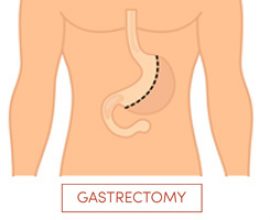Determining The Success Rate of The Gastric Sleeve

Gastric sleeve, or sleeve gastrectomy, is one of the best ways to help those who are morbidly obese lose weight. If you are having trouble with weight loss, and you need surgical assistance, then gastric sleeve surgery may be right for you. It is rapidly emerging as a reasonable alternative to traditional roux-en-Y gastric bypass.
What Is The Difference Between Gastric Gastrectomy and The Roux-en-Y?
During the gastric gastrectomy procedure, the size of the stomach is reduced by 80 percent. During the roux-en-Y surgery, the stomach is reduced to the approximate size of the egg, and the digestive process is altered by rerouting the stomach straight to the middle part of the intestines. Though it is an effective surgery for those who are morbidly obese, the side effect profile and healing times are greater. Gastric sleeve simply alters the stomach’s size, but it leaves the digestive system unchanged.
What Are The Success Rates?
The gastric sleeve has great success rates. It is more effective than the gastric band in several studies. Patients experience improvements in their overall health, their mobility, comorbidities like diabetes, hypertension and sleep apnea. In general, they have an overall improved quality of life. It is considered to be a safe procedure with a low complication rate.
According to the U.S. Department of Health and Human Services, patients can lose an average of 55.3 pounds with this surgical procedure. Patients with traditional bypass lose around 64.3 pounds on average. The report shows that patients lost 50 percent of their body weight, and they were able to keep it off for 6+ years.
Gastric Sleeve Is An Excellent Weight Loss Option
Sleeve gastrectomy was originally created as a correction method to other gastric bypass procedures. Then it evolved into a two-part surgery to help patients who were in the super morbidly obese category. The biggest concern with a full bypass is being under anesthesia for long periods.
According to the American Society for Metabolic and Bariatric Surgery, patients will experience a weight loss of greater than 50 percent within a three to five-year span. This weight loss is comparable to that of a traditional bypass with maintenance. No foreign objects are placed into the body and there is no need to re-route the food stream. The hospital stay is much shorter, averaging about two days. This surgery causes favorable changes in the hormones within the stomach, and it suppresses hunger. Overall, the sleeve gastrectomy is a great option for those who are super morbidly obese or those who want less recovery time.
Related Posts
5 Risks of Obesity
How Sleeve Gastrectomy Works
The Advantages of Orbera
Are You a Candidate for Sleeve Surgery?
Contact Info
3420 Bristol St #700, Costa Mesa, CA 92626, USA
Orange Location
1310 W Stewart Dr. Suite 310, Orange, CA 92868, USA





*DISCLAIMER
In compliance with 16 CFR 255 and Federal Trade Commission Guidelines on the use of endorsements and testimonials in the marketing and advertising of websites:
The testimonials, statements, and opinions presented on our website are only applicable to the individuals depicted, and may not be representative of the experience of others. The testimonials are voluntary provided and are not paid, nor were they provided with free products, services, or any benefits in exchange for said statements. The testimonials are not indicative of future results or success of any other individuals. South Coast Specialty Surgery Center cannot and does not guarantee the medical outcome or the results of individuals utilizing the services provided by us or the providers in our network, or from any of the websites we link, or refer to. The testimonials and endorsements found on the site for the benefit of the site or individual services or procedures are, to the best of our knowledge, the true statements and beliefs of the individuals providing them. In short, surgery involves risk, results may vary, and outcomes are not guaranteed.
Some pages of this website may feature a depiction of a model showing emphasis of the torso.
Product names may be mentioned in testimonials or elsewhere, and are trademarks or registered trademarks of their respective holders. Please refer to our Terms and Risks of Surgery pages for more information. Gastric Sleeve Surgery Centers performs Gastric Sleeve Surgery in Orange County, San Diego, Los Angeles, Riverside County and other location in Southern
California.











